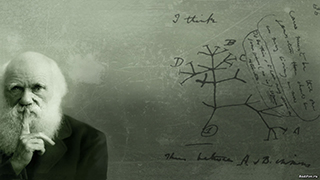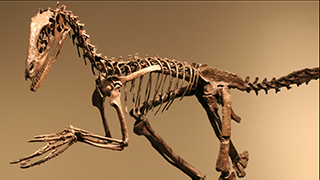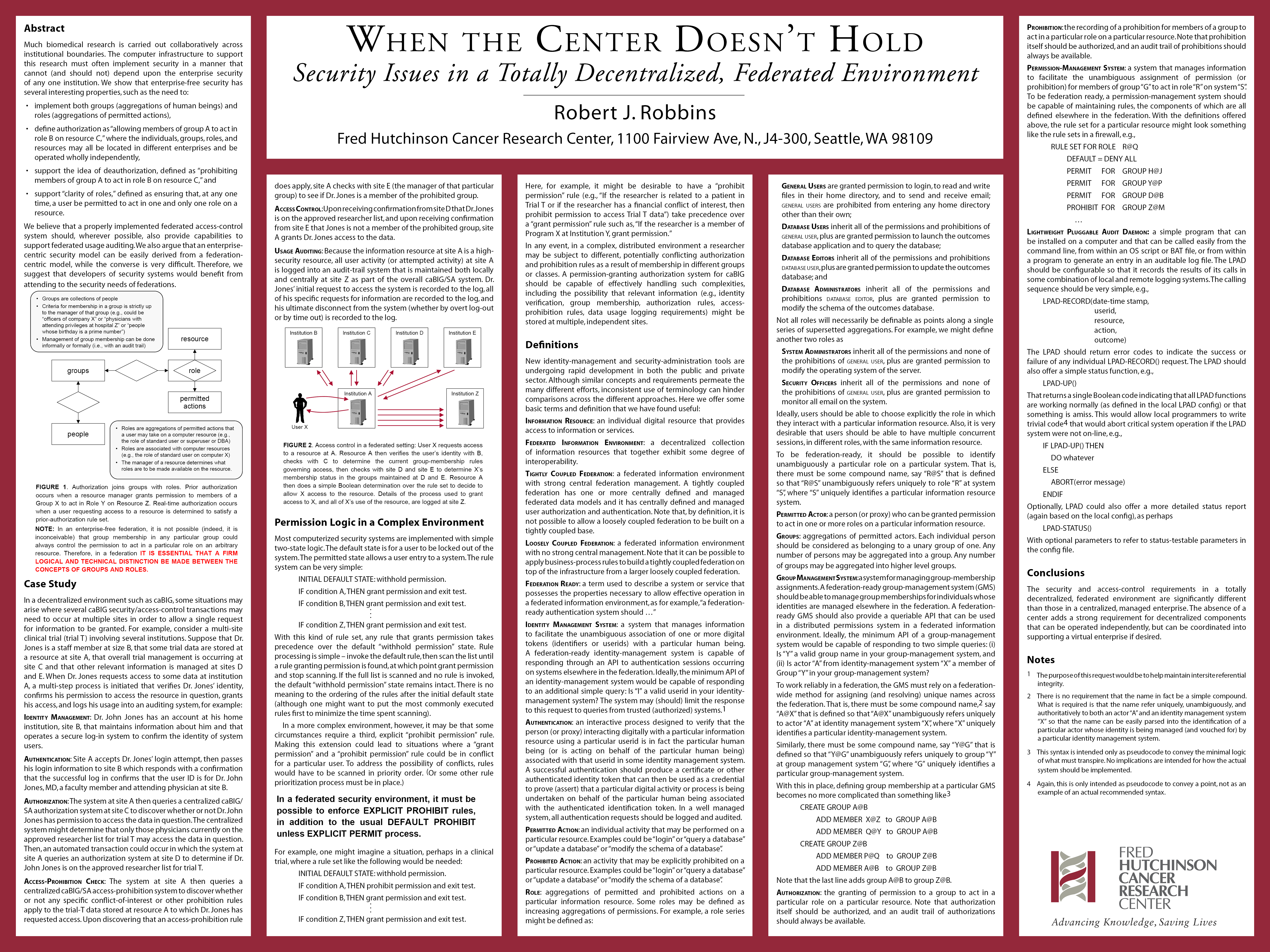Other Sites:
Use the mouse wheel or touch-screen gestures to zoom and explore the poster.
Robbins, RJ. 2005. When the center doesn't hold: Security issues in a totally decentralized, federated environment. Poster presented at: Educause CAMP Med Workshop: Identity and Access Management for Medical Applications. 2005 Feb 9–11; Baltimore, Maryland. Retrieved from: http://www.rj-robbins.com/portfolio/publications/educause-poster/
When the Center Doesn't Hold
EDUCAUSE CAMP Med: Identity and Access Management for Medical Applications Workshop
Baltimore, Maryland: 9–11 February 2005
Abstract: Much biomedical research is carried out collaboratively across institutional boundaries. The computer infrastructure to support this research must often implement security in a manner that cannot (and should not) depend upon the enterprise security of any one institution. We show that enterprise-free security has several interesting properties, such as the need to: (1) implement both groups (aggregations of human beings) and roles (aggregations of permitted actions), (2) define authorization as "allowing members of group A to act in role B on resource C," where the individuals, groups, roles, and resources may all be located in different enterprises and be operated wholly independently, (3) support the idea of deauthorization, defined as "prohibiting members of group A to act in role B on resource C," and (4) support "clarity of roles," defined as ensuring that, at any one time, a user be permitted to act in one and only one role on a resource. We believe that a properly implemented federated access-control system should, wherever possible, also provide capabilities to support federated usage auditing. We also argue that an enterprise-centric security model can be easily derived from a federation-centric model, while the converse is very difficult. Therefore, we suggest that developers of security systems would benefit from attending to the security needs of federations.
Experience and Expertise
Researcher
Robbins holds BS, MS, and PhD degrees in the life sciences. He served as a tenured faculty member in the Zoology and Biological Science departments at Michigan State University. He is currently exploring the intersection between genomics, microbial ecology, and biodiversity — an area that promises to transform our understanding of the biosphere.
Educator
Robbins has extensive experience in college-level education: At MSU he taught introductory biology, genetics, and population genetics. At JHU, he was an instructor for a special course on biological database design. At FHCRC, he team-taught a graduate-level course on the history of genetics. At Bellevue College he taught medical informatics.
Administrator
Robbins has been involved in science administration at both the federal and the institutional levels. At NSF he was a program officer for database activities in the life sciences, at DOE he was a program officer for information infrastructure in the human genome project. At the Fred Hutchinson Cancer Research Center, he served as a vice president for fifteen years.
Technician
Robbins has been involved with information technology since writing his first program as a graduate student. At NSF he was the first program officer for database activities in the life sciences. At JHU he held an appointment in the CS department and served as director of the informatics core for the Genome Data Base. At the FHCRC he was VP for Information Technology.
Publisher
While still at Michigan State, Robbins started his first publishing venture, founding a small company that addressed the short-run publishing needs of instructors in very large undergraduate classes. For more than 20 years, Robbins has been operating The Electronic Scholarly Publishing Project, a web site dedicated to the digital publishing of critical works in science, especially classical genetics.
Speaker
Robbins is well-known for his speaking abilities and is often called upon to provide keynote or plenary addresses at international meetings. For example, in July, 2012, he gave a keynote address at the Global Biodiversity Informatics Congress, sponsored by GBIF and held in Copenhagen. The slides from that talk can be seen HERE.
Facilitator
Robbins is a skilled meeting facilitator, able to keep discussions moving through complex issues. He prefers a dynamic approach, in which part of the meeting involves breakout groups that are created by the participants in real time: anyone can propose a break out group; anyone can choose to attend any breakout group. The groups with the most interested parties are convened. All attendees together later for reports.
Designer
Robbins has been engaged with photography and design since the 1960s, when he worked for a professional photography laboratory. He now prefers digital photography and tools for their precision and reproducibility. He engages in graphic design as a hobby.
RJR Picks from Around the Web (updated 11 MAY 2018 )
Old Science

Weird Science

Treating Disease with Fecal Transplantation
Fossils of miniature humans (hobbits) discovered in Indonesia
Paleontology

Dinosaur tail, complete with feathers, found preserved in amber.
Astronomy

Mysterious fast radio burst (FRB) detected in the distant universe.
Big Data & Informatics

Big Data: Buzzword or Big Deal?
Hacking the genome: Identifying anonymized human subjects using publicly available data.
